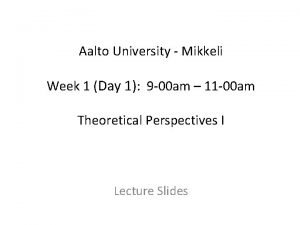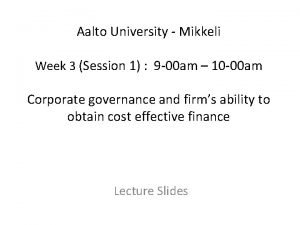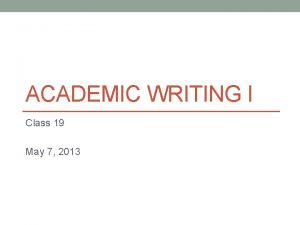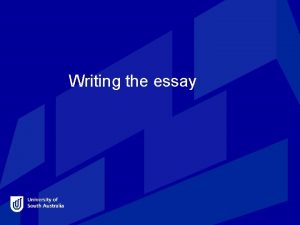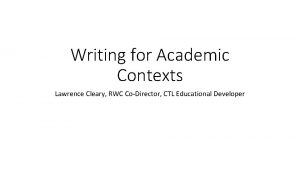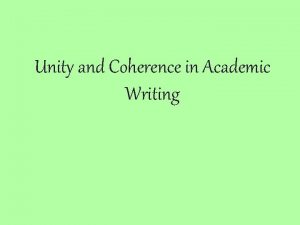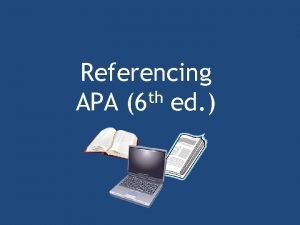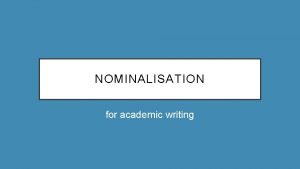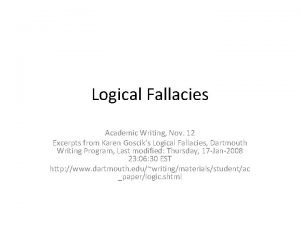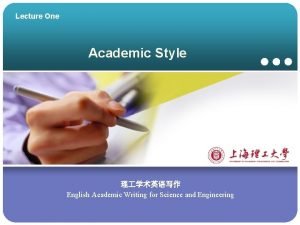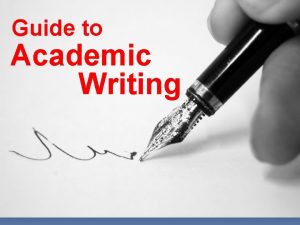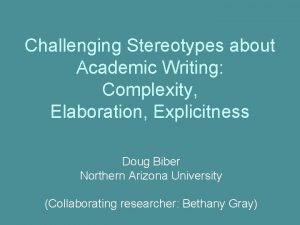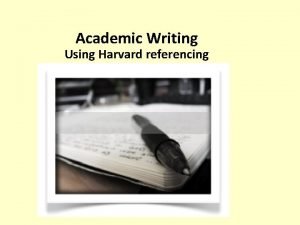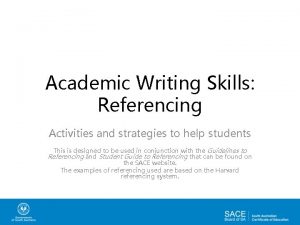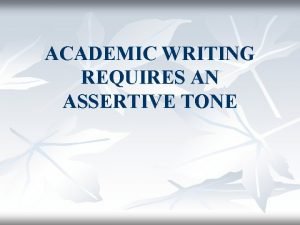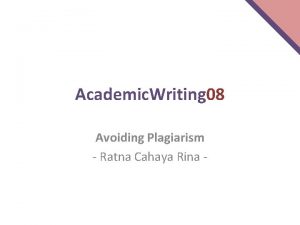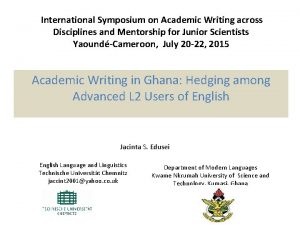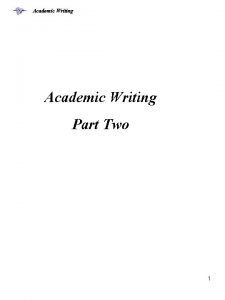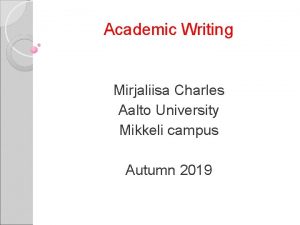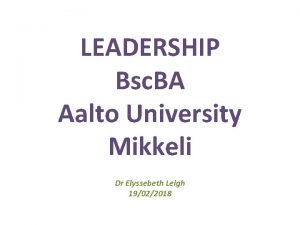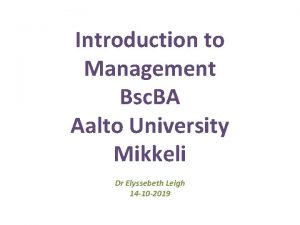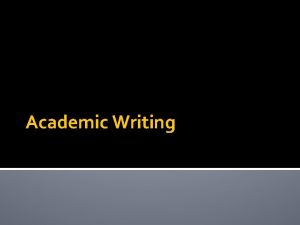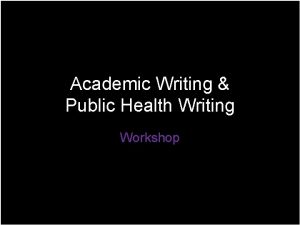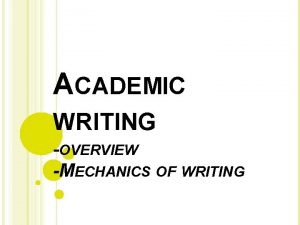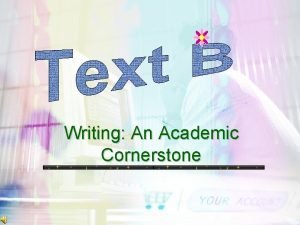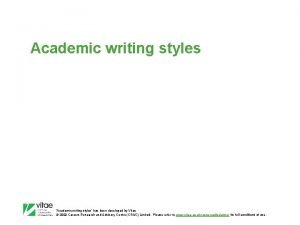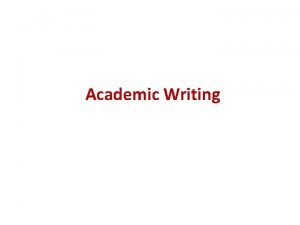Academic Writing Mirjaliisa Charles Aalto Mikkeli campus Autumn























- Slides: 23

Academic Writing Mirjaliisa Charles Aalto / Mikkeli campus Autumn 2017

Team chat 1) Why do universities teach writing skills? 2) When you submit written work to a professor, does it matter how it is written? 3 a) How does academic writing differ from other kinds of writing … 3 b)…and how does it NOT differ?

What IS Academic Writing? Part 1: Why? What?

Why do we teach Academic Writing? Because good writing benefits �YOU and �THE UNIVERSITY NOW and later in your professional life

Benefits to YOU Good writing skills will help you in your university studies. Writing helps you remember and consolidate facts makes you conscious of what you know, and what you do NOT know creates an ENTITY out of bits of knowledge in different courses Good writers give a good impression of themselves in the professional world

How does the university benefit? Writing helps you become a high class graduate who will contribute to the university’s reputation / brand

WHY and HOW do we need to learn ACADEMIC writing …? … isn’t it just like any other type of writing…? YES and NO.

Groups of people / ‘Communities’ have their own genres of writing Examples: �the business world �the young >< the old �engineers in a specific company �Academia Think of the different kinds of writing that these communities do…

Different situations and media used require different registers Social media? A business consultant’s recommendations? A job application? An academic essay / report/ thesis?

Genres and communities A genre is a type of text with a specific layout, organization of information, and often specific type of language expected by the community within which it is produced. Adherence to generic conventions increases readability and ease of understanding of documents.

Examples of academic genres – ‘papers’ Research reports ◦ Inform, but also argue a point Theses ◦ Examine an issue - present a conclusion Abstracts and summaries ◦ Give a quick overview of main content, without detail Essays / Essay answers in exams ◦ Discuss an issue from different perspectives

You are now in an academic community. An academic community – like all communities - has clear expectations for what purposes your papers should address, how they should be organized, and what they should look like. Different (academic) disciplines have different conventions, but all disciplines share certain values:

The academic world believes in 1) Truth of your writing - Rigorous research methods - Obtaining knowledge of what has been done in the field 2) Giving evidence for what you write - Credible support for your findings SO: Academic writers CONVINCE readers, but also INFORM

The academic world also believes in … Balanced argumentation - serious (but not boring!), unemotional writing and language SO: You have to learn to write in a suitable style 4) Dialogue, Debate - Exchanging views with others - Argument and persuasion through evidence SO… 3)

How does ‘academic arguing’ differ from ‘ordinary arguing’? In the ‘real’ world we often argue in emotional terms about likes, dislikes, opinions ◦ 'I didn’t like the film. Did you? ‘. ◦ ‘It was rubbish! In Academia you start off from interests / ethical views and argue on the basis of facts or what you see to be facts

Characteristics of academic writing 1 Purpose: to inform, convince, arouse interest in an issue ◦ Aim: to interest - NOT to entertain ◦ Main points: information and argument – for and against – NOT just what yourself THINK. ◦ Your thoughts and beliefs come through in your topic choice, choice of thesis/argumentation / readings/ discussions / research

Characteristics of academic writing 2 Usually applies the standard written form of language: ◦ ◦ ◦ Can be more complex than spoken language More sophisticated sentence structure/vocabulary No colloquialisms/slang

Characteristics of academic writing Aims to be as precise: � Incorporates citations to background literature; 3 � uses specific expressions; � avoids vague / generalizing language – unless the vagueness or generalization is deliberate.

Example: Compare (a) and (b) (a) “ We don't really know what language proficiency is but many people have talked about it for a long time. Some researchers have tried to find ways for us to make teaching and testing more communicative because that is how language works. I think that language is something we use for communicating, not something for us to study, and we should remember that when we teach and test it. ”

Text (b) “The question of what constitutes "language proficiency" is at the core of many hotly debated issues in the areas of bilingual education and second language pedagogy and testing. Researchers have suggested ways of making second language teaching and testing more "communicative" (e. g. , Canale and Swain, 1980; Oller, 1979 b) on the grounds that a communicative approach better reflects the nature of language proficiency than one which emphasizes the acquisition of discrete language skills. ”

Informal, spoken style (a) “ We don't really know what language proficiency is but many people have talked about it for a long time. Some researchers have tried to find ways for us to make teaching and testing more communicative because that is how language works. I think that language is something we use for communicating, not an object for us to study and we should remember that when we teach and test it. ”

Academic, more formal, written style (b) “The question of what constitutes "language proficiency" is at the core of many hotly debated issues in the areas of bilingual education and second language pedagogy and testing. Researchers have suggested ways of making second language teaching and testing more "communicative" (e. g. , Canale and Swain, 1980; Oller, 1979 b) on the grounds that a communicative approach better reflects the nature of language proficiency than one which emphasizes the acquisition of discrete language skills. ”

Basic Principles of Academic Style Preciseness Logical structure of text Unemotional Issue oriented Careful with vague generalizations
 Aalto mikkeli
Aalto mikkeli Into aalto mikkeli
Into aalto mikkeli Aalto university mikkeli
Aalto university mikkeli Maavoimien esikunta mikkeli
Maavoimien esikunta mikkeli Technical language in academic writing
Technical language in academic writing Business writing vs academic writing
Business writing vs academic writing Charles luther manson
Charles luther manson Example of academic writing
Example of academic writing Writing in academic contexts
Writing in academic contexts Unity coherence
Unity coherence Quote about academic writing
Quote about academic writing What is nominalisation in writing
What is nominalisation in writing Fallacies in academic writing
Fallacies in academic writing Identify the hedging expressions in the following sentences
Identify the hedging expressions in the following sentences Myth or legend is academic writing
Myth or legend is academic writing Explicitness in academic writing
Explicitness in academic writing Harvard academic writing
Harvard academic writing How to list in academic writing
How to list in academic writing Assertive writing
Assertive writing Academic writing and composition
Academic writing and composition Contoh plagiarism
Contoh plagiarism 10 principles of academic writing
10 principles of academic writing Academic english reading and writing across the disciplines
Academic english reading and writing across the disciplines Formality in academic writing exercises
Formality in academic writing exercises
